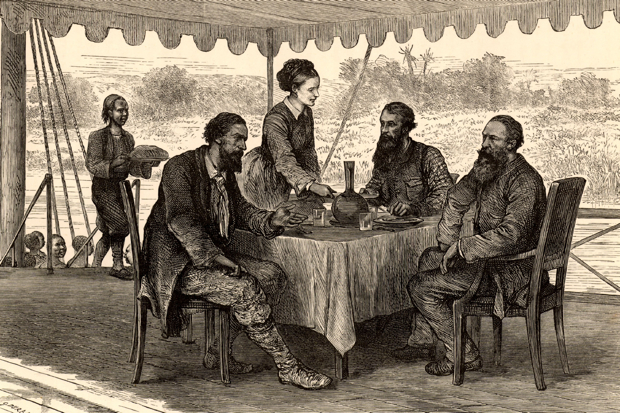Sebastian Barry’s new novel opens with a bang, as a German torpedo hits a supply ship bound for the Gold Coast. We experience everything through the senses of ‘temporary gentleman’ Jack McNulty — an Irish officer in the British army with a short-term commission. Brimful of whiskey, his racing winnings jingling cheerily in his pocket, McNulty stands on deck ‘somewhat in love with an unknown coastline’, and the reader is, instantly, somewhat in love, and completely bound up with, this red-haired chancer.
In the seconds that follow the torpedo, McNulty, almost a medieval Everyman, experiences a vision of heaven and hell and all stages between. One moment ‘a winged man suspended’, the next plummeting, ‘a hundred demons yanking on my legs’, he sends his
last signal of love…to Mai and my children, up the night-filthied coast of Africa, across the Canaries, across the old boot of England and the ancient baby-shape of Ireland…I love thee, Mai, I am sorry, I am sorry.
But it’s not his last signal of love. McNulty survives the shipwreck, ‘ticking with life, triumphant, terrified’, only to be hurled back into the shipwreck of his marriage, the desolation of his failed fatherhood, the smoking ruins of his youthful talents, and the reader hurtles along with him. He’s writing the story of his doomed life in Accra in 1957, in decrepit late middle age.
The relationship between McNulty and his Ghanaian servant Tom Quaye, both exiled from the family and homeland, is sensitively done, and the atmosphere of dusty colonial sunset is entirely convincing, as are other excursions to the Sahara, the north-west passage, Yorkshire and elsewhere; but it is when the story backtracks to the Sligo of the 1920s and 1930s that one’s heart leaps into one’s mouth and stays there.
In 1922, Mai Kirwan was the college siren, teasing and lovely on the rainswept shore. Jack, already the ‘buveur of Sligo’, induces her to marry him. She declines into a drunken childbeater, her life a mucky tangle of self-hatred and deceit. How much of her ruin is Jack’s fault? Barry’s portrayal of a marriage shaped or unravelled by alcoholism, its fog pierced with moments of intense perception, is second to none. His ability to make us believe in the McNultys’ mess as a great love story is astonishing.
Here are all the usual ingredients of a novelist’s Ireland — whiskey, boiled cabbage, violence, prayers, lost causes, rain. And yet there’s nothing about A Temporary Gentleman that feels clichéd or predictable. Barry’s inventive prose makes us see stale things afresh. The reason we love McNulty, this unreliable, selfish failure, is because we view things through his eyes; we share the responses of a man who for all his faults sees a world ‘ticking with life’. Mai’s anti-depressant pills are ‘like the buttons you might sew on a robin’s waistcoat’; driving through the Ishkuman Pass ‘it occurred to me that the crust of the earth was just a sort of grave for creation’; a lark in the North African desert ‘burst up from her cup of sand… and, like a needle flashing in my mother’s hand of old made a long stitch between earth and heaven.’
Members of the McNulty family have featured in other novels by Sebastian Barry, but you don’t need to have read them to appreciate The Temporary Gentleman — exhilarating, exhausting, compulsive and even funny.
Got something to add? Join the discussion and comment below.
Get 10 issues for just $10
Subscribe to The Spectator Australia today for the next 10 magazine issues, plus full online access, for just $10.
Available from the Spectator Bookshop, £14.99, Tel: 08430 600033
You might disagree with half of it, but you’ll enjoy reading all of it. Try your first month for free, then just $2 a week for the remainder of your first year.














Comments
Don't miss out
Join the conversation with other Spectator Australia readers. Subscribe to leave a comment.
SUBSCRIBEAlready a subscriber? Log in